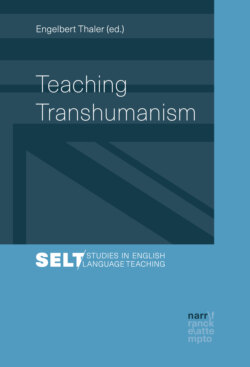Читать книгу Teaching Transhumanism - Группа авторов - Страница 42
На сайте Литреса книга снята с продажи.
Bibliography
ОглавлениеBartosch, Roman (2019). “We Have Always Already Been Becoming Posthuman? Posthumanism in Theory and (Reading) Practice.” In: Baumbach, Sibylle/Neumann, Birgit (eds.). New Approaches to the Twenty-First-Century Anglophone Novel. Basingstoke: Palgrave Macmillan, 137–155.
Bartosch, Roman/Hoydis, Julia (eds.). (2019). Teaching the Posthuman (= anglistik&englischunterricht 89). Heidelberg: Winter.
Bayne, Siân (2018). “Posthumanism: A Navigation Aid for Educators.” On Education. Journal for Research and Debate. https://www.oneducation.net/no-02-september-2018/posthumanism-a-navigation-aid-for-educators (accessed 30/01/2021)
Becker, Daniel (2019). “The Digital Citizen 2.0 – Re-Negotiating Issues of Digital Citizenship Education.” Arbeiten aus Anglistik und Amerikanistik 44:2, 167–193.
Brune, Carlo (2020). Literarästhetische Literalität. Literaturvermittlung im Spannungsfeld von Kompetenzorientierung und Bildungsideal. Bielefeld: Transcript.
Dawkins, Richard (1976). The Selfish Gene. Oxford: Oxford University Press.
Garrard, Greg (2017). “In-flight Behaviour: Teaching Climate Change Literature in First-Year Intro English.” In: Siperstein, Stephen/Hall, Shane/LeMenager, Stephanie (eds.). Teaching Climate Change in the Humanities. London/New York: Routledge, 118–125.
Haraway, Donna J. (1991). Simians, Cyborgs, and Women. The Reinvention of Nature. New York: Routledge.
Hassan, Ihab (1977). “Prometheus as Performer: Towards a Posthumanist Culture?” The Georgia Review 31:4, 830–850.
Hayles, N. Katherine (1999). How We Became Posthuman. Virtual Bodies in Cybernetics, Literature, and Informatics. Chicago: University of Chicago Press.
Herbrechter, Stefan (2013). Posthumanism. A Critical Analysis. London: Bloomsbury.
Höfler, Elke (2021). “Memes als multimodale und synmediale Artefakte im Sprachunterricht.” In: k:ON – Kölner Online-Journal für Lehrer*innenbildung (forthcoming).
Kreft, Jürgen (1977). Grundprobleme der Literaturdidaktik. Heidelberg: Quelle & Meyer.
Kurzweil, Ray (2005). The Singularity is Near. When Humans Transcend Biology. New York: Viking.
Nünning, Ansgar (2007). “Fremdverstehen und Bildung durch neue Weltansichten: Perspektivenvielfalt, Perspektivenwechsel und Perspektivenübernahme durch Literatur.” In: Hallet, Wolfgang/Nünning, Ansgar (eds.). Neue Ansätze und Konzepte der Literatur- und Kulturdidaktik. Trier: wvt, 123–142.
Pedersen, Helena (2010). “Is ‘the Posthuman’ Educable? On the Convergence of Educational Philosophy, Animal Studies, and Posthumanist Theory.” Discourse: Studies in the Cultural Politics of Education 31:2, 237–250.
Robson, Garry. “‘You Are Forced to Be Who You Are’: Embodiment and Social Media in Intercultural Experience.” In: Robson, Garry/Gorzata Zachara, Mal (eds.). Digital Diversities. Social Media and Intercultural Experience. Cambridge: Cambridge Scholars, 12–34.
Spitzer, Manfred (2012). Digitale Demenz. Wie wir uns und unsere Kinder um den Verstand bringen. München: Droemer.
Turkle, Sherry (2011). Alone Together. Why We Expect More from Technology and Less from Each Other. New York: Basic Books.
Turkle, Sherry (2015). Reclaiming Conversation. The Power of Talk in a Digital Age. New York and London: Penguin.
Volkmann, Laurenz (2015). “Literary Literacy and Intercultural Competence: Furthering Students’ Knowledge, Skills and Attitudes.” In: Delanoy, Werner/Eisenmann, Maria/Matz, Frauke (eds.). Learning with Literature in the EFL Classroom. Frankfurt am Main: Peter Lang, 49–66.
Weaver, John (2010). Educating the Posthuman. Bioscience, Fiction, and Curriculum Studies. Rotterdam: Sense.
